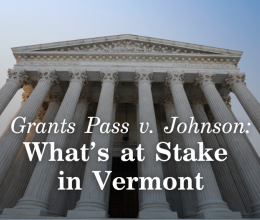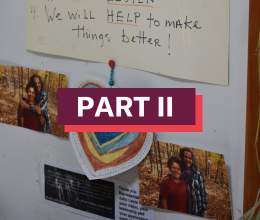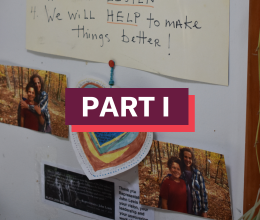
By James Lyall, Executive Director, ACLU of Vermont
The Vermont affiliates of the NAACP and ACLU this month invited to Montpelier five family members whose loved ones were lost to police violence, and who are a part of the Love Not Blood Campaign. Their stories are a powerful reminder that our ongoing work to bring more oversight and accountability to policing is a matter of life and death, particularly in overpoliced communities of color.
They also remind us that Vermont is not an outlier or an exception. Our criminal legal system has some of the worst racial disparities in the country, and police data from across the state confirms what so many Black Vermonters continue to tell us: year after year: people of color are stopped, searched, ticketed, and prosecuted at much higher rates than their white counterparts.
Take Burlington, for example, where Black people account for six percent of the population, but twenty-one percent of arrests and thirty-six percent of those subjected to police use of force. Burlington police last year were twice as likely to keep Black people in custody than white people, and half as likely to send Black people to diversion as an alternative to incarceration. Studies of Vermont police data released in 2016, 2017, 2018, and 2020 all reached similar conclusions.
Unfortunately, as in years past, law enforcement officials continue to insist that police should be left to police themselves, while denying or downplaying the extent of racial profiling in Vermont communities. Some go so far as to suggest that improving police oversight could deter police recruitment, as if we can’t expect new officers to be held accountable to the laws and values of the communities they serve.
It's a cynical argument and a false choice, and Vermonters should reject it. The fact is, we can have both safer communities and more accountable police. As the Love Not Blood Campaign reminds us, true public safety—encompassing all community members, including those who are overpoliced and discriminated against—requires more police accountability, not less.
The good news is that Vermonters have ample opportunities this year to win overdue police reforms. Towns like Bennington and Burlington—both with long histories of biased policing—are considering whether to empower civilian oversight of their police departments.
Related citizen oversight legislation is up for consideration in the State House, along with several other police reform proposals. One would limit police enforcement of minor vehicle infractions that are often used as pretexts for traffic stops, and could drastically reduce profiling and racial disparities in traffic enforcement. Another would prevent police from lying to children in interrogations, a practice that is still allowed in Vermont and has been known to contribute to false confessions and wrongful convictions.
As our state considers ways to enhance police accountability and reimagine law enforcement’s role in our communities, it is imperative that we prioritize racial justice and center the voices of those who are impacted by unjust policing practices. Vermont voters and their representatives have some golden opportunities to do that this year.
A version of this op-ed appeared in the Rutland Herald and other publications.


